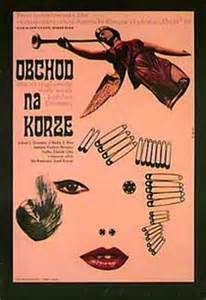I’ve said in the past that I don’t have too much experience with the Czech New Wave. In fact, until I reviewed Daisies, I had been pretty much ignorant of the existence of that particular film movement. Well, with now having watched The Shop on Main Street, I can say I’ve gotten a better handle on the movement, even if my overall opinion finds the films of the Czech New Wave to be a little bit similar to other film New Waves in other countries. The Shop on Main Street is an excellently-made film, that has much in common with other Czech films of the time, but I still couldn’t help but feel a little let down by it. I’ll explain why.
Jozef Kroner stars as Tono, a man with little to his name in a small Slovakian town circa WWII, which does little to please his harpy of a wife. His brother-in-law, who is either German or is at the very least working fully with them, and whom Tono is none too fond of, drops by on orders of the implementation of a Nazi regulation known as Aryanization, where members of the Aryan race are put in charge of shops and businesses owned by Jews in order to take them over, until the Jews are eventually deported. Tono has been selected to take over a small hat shop, owned by the elderly Mrs. Lautmann, played superbly by Ida Kaminska in a rare Oscar-nominated foreign language role. The film details the relationship between the two, with the initially reluctant Tono becoming more concerned about the future of Mrs. Lautmann and the shop, especially with shadows of the Final Solution looming closer and closer to the town. The one major thing I did have a qualm about was the relationship between the two main characters. The Book’s passage makes a point about how Tono and Mrs. Lautmann begin spending time together, and how their relationship evolves to become one of care and concern on the part of Tono. While the concern was there in the second half, I didn’t see any of the building of their relationship up to that point that the editors seem to have; it is instead mostly Tono, a carpenter by trade, fixing up the various pieces of furniture and assortments in Mrs. Lautmann’s apartment, and one scene where he is called in to help with a particularly busy day in the shop, and that’s it. This sort of jump, without the natural progression of evolving characterization that comes with telling a linear story, seems to be unnervingly prevalent on the list, and it cheapened what would have otherwise been an excellently moving picture. Otherwise, though, this was very well made, though no particular features were all that outstanding enough to warrant specific mention. Well, save one: the music, which was very unusual for the tone the film wanted to take, opting for haunting and moribund violin notes, even during the film’s more carefree or even cheerful sections (though it did come into excellent play in the film final twenty minutes or so). The overdubbing was also just noticeable, especially the occasional moment when the voices didn’t match the level of the acting, but on the whole it was at least a little better than other films with this weakness.
I don’t really know why I was expecting more than I got with this one, but when it was over I couldn’t help but sigh a little. It was good, but, probably from all the reviews I’ve found calling it a masterpiece, I was looking for a little bit more. That said, if you ever do get the chance to see this one, it is certainly not one for you to cross the street to avoid; the two leads in particular are well worth the watch, and indeed the two were given a Special Mention award at Cannes for their acting. I will say, as a final note, that I have no idea what the hell is going on with that poster up there, because it seemingly has nothing to do with the film in any way, so don’t let the randomness of it dissuade you from this one; there’s more to this than that poster seems to cover.
Arbitrary Rating: 8/10

